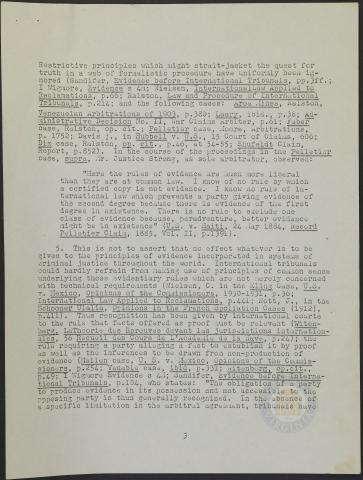
Page 3
| Parent | Perpetuation of testimony by Witnesses in U. S. for Presentation to the International Military Tribunal |
|---|---|
| Date | 18 June 1945 |
| Language | English |
| Collection | Tavenner Papers & IMTFE Official Records |
| Box | Box 3 |
| Folder | General Reports and Memoranda from June 1946 |
| Repository | University of Virginia Law Library |
Restrictive principles which might strait-jacket the quest for truth in a web of formalistic procedure have uniformly been ignored (Sandifer, Evidence before International Tribunals, pp.3ff.; Reclamations, p. 66; Ralston, Law and Procedure of International Tribunals, p. 214; and the following cases: Aroa Mines, Ralston, Venezuelan Arbitrations of 1903, p. 380; Lasry, ibid., p. 38; Administrative Decision No. 11, War Claims Arbiter, p. 61; Faber case, Ralston, op. cit./ Pelletier case, Moore, Arbitrations, p. 1752; Daivd j., in Hubbell v. U.S.., 15 Court of Claims , 606; Dix case, Ralston, op cit., p. 46, at 54-55; Shufeldt Claim, Report, p. 852). In the course of the proceedings in the Pelletier case, supra, Mr. Justice Strong, as sole arbitrator, observed:
“Here the rules of evidence are much more liberal than they are at common law. I know of no rule by which a certified copy is not evidence. I know no rule of international law which prevents a party giving evidence of the second degree because there is evidence of the first degree in existence. There is no rule to exclude one class of evidence because, peradventure, better evidence might be in existence” (U.S. v. Haiti, 24 May 1884, Record Pelletier Claim, 1885, Vol. 11, p 1391)
5.This is not to assert that no effect whatever is to be given to the principles of evidence incorporated in systems of criminal justice throughout the world. International tribunals could hardly refrain from asking use of principles of common sense underlying those evidentiary rules which are not merely concerned with technical requirements (Nielsen, C. in the Kling Case, U.S. v. Mexico, Opinions of the Commissioners, 1930-1931, p. 36; International Law Applied to Reclamations, p. 441; Nott, J., in the Schooner Ulalia, Opinions in the French Spoliation Cases (1912), p. 411). Thus recognition has been given by international courts to the rule that facts offered as proof must be relevant (Witenberg, LaTheorie des Epreuves devant las juriseictions internationals, 56 Recueil des Cours de L’Academie de la Have, p. 24); the rule requiring a party alleging a fact to establish it by proof as well as the inferences to be drawn from non-production of evidence (Mallen case, U.S. v. Mexico, Opinions of the Commissioners, p. 254; Venable case, ibid, p. 331; Witenberg, op cit., p. 49; I Wigmore Evidence s 4M; Sandifer, Evidence before International Tribunals, p. 104, who states: “The obligation of a party to produce evidence in its possession and not accessible to the opposing party is thus generally recognized. In the absence of a specific limitation in the arbitral agreement, tribunals have
3
